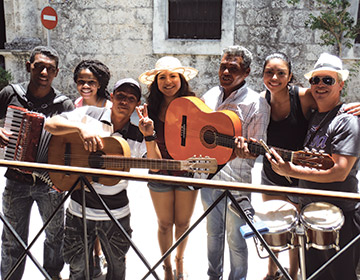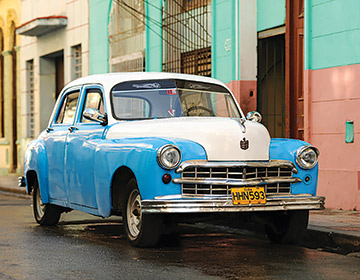We Went to Cuba
CBE professors and students get a front-row seat to an island about to be flooded by cultural and economic change.

Welcome to Cuba.
Here you’ll find Castro’s three biggest successes—health care, education and a legion of gifted athletes. You’ll also find his three biggest failures—breakfast, lunch and dinner.
That often-told joke crystalizes what two TU business professors and 15 students found when they visited the island nation for 11 days last spring—an eye-opening shot of pure socialism and a Communist government.
“Cuba provides the last glimpse of a planned economy,” explains Seth Gitter, who along with fellow business professor Tobin Porterfield began planning the study abroad trip for students in TU’s College of Business and Economics more than two years ago.
“ People told us they hadn’t seen a fresh egg or anything other than powdered milk in three years. ”
And that economy “works better than one might expect,” he adds.
Health care is free. So is education. In fact one of Cuba’s biggest exports is physicians, many of whom work in Venezuela, the country that propped up the Cuban economy after the USSR collapsed, and Cuba lost Soviet aid and its markets for exports, Gitter says.
Food production and low wages represent the darker side of this socialist equation. Sugar, tobacco and some fruits are the main crops grown on state-controlled farms.
“No one is starving,” Porterfield notes, “but people told us they hadn’t seen a fresh egg or anything other than powdered milk in three years.” As the Towson group discovered, the daily diet, theirs and the rest of the population, consists of rice and beans.
Wages are regulated. According to Porterfield, pay scales range from $18 a month for a line worker to $32 a month for doctors and engineers. The result is a level playing field—no middle class—but also no worker incentive.

The economy is further controlled by a single government bank and a peculiar two-currency system—the Cuban peso and the convertible peso. “The convertible peso is pegged to the dollar and worth 25 times more than the Cuban peso,” Gitter says. While most workers are paid in Cuban pesos, nearly all consumer goods are priced in convertible pesos making most items simply unaffordable, he adds.
This dual currency system is leading to an exodus of professionals. Engineers, for example, says Gitter, are leaving jobs to become taxi drivers. By catering to the growing tourist trade, workers can take home more convertible pesos and raise their standard of living.
Back in Time
There’s a certain thrill in experiencing a country where doors have been mostly shut to Americans for more than 50 years. Since 1960, a U.S. trade embargo prohibited Americans from trading, traveling (with few exceptions) and investing in Cuba.
Last December’s Obama-Castro handshake and the August reopening of the U.S. Embassy in Cuba removed some of those barriers but not the dichotomies of an island nation stuck in time. The Towson group discovered the joys of seeing 1950s-vintage Chevys, pristine beaches and a vibrant music scene along with the hassles of leaving behind Internet access, free trade and free speech.
The CBE students enrolled in one of two courses, The Economics of Cuba or Operations Management. They toured businesses, farms and historic sites, and heard lectures by officials or university professors that covered Cuban history and Cuban economics, experiences that will give them a competitive advantage when seeking internships, their professors say.

But spotty cell phone service and limited Internet access—11 a.m. to 1 p.m.—which often crashed due to sheer volume, left students flummoxed. The White House is encouraging U.S. companies to invest in expanded telecommunications in Cuba, but it remains to be seen whether a country that controls access to information will open up Internet links.
Paid monitors, government agents, already keep tabs on political rhetoric and every day conversation. “It’s very Cold War,” notes Porterfield, about the government’s tight control. “It was hinted that we should be careful about what we said and what we asked. Folks get reported if they violate policies.”
Finding a drop to drink
Perhaps the most telling anecdote about the Cuban economy was the search for water. Before departing on a field trip, the two professors asked their tour guide where to buy water so they could refill water bottles during the long hot journey. Head scratching and pondering ensued, eventually followed by a 15-minute bus ride to an unmarked door.
“Inside there was water available for purchase,” Gitter says. But the deliberation, the trek and the lack of advertising was a perfect illustration of the lack of retail trade, even in the capital city of Havana.
With so few competitors, Cuba might seem like the perfect place for an entrepreneur. “My students always ask me if I would open a business in Cuba,” Gitter says.
He would not. “I don’t know enough about the local economy and I would need to have a Cuban partner,” he explains.
Even major chains such as Starbuck’s or MacDonald’s must have a majority Cuban ownership. And unlike China, which seems to welcome new business and has an emerging middle class, Cuba appears less interested and Cubans have less money to spend, he adds.
American businesses with products to sell won’t find much of a market in Cuba, Gitter says. Even tourism could experience an initial boom, then a bust, as the novelty wears off and visitors tire of the lack of luxuries. But exporters, those who trade in products such as rum or cigars, may find money to be made.
Both Gitter and Porterfield agree that the biggest surprise on the trip was the warmth of the Cuban people. “They have a huge animosity toward the American government because of the blockade and are desperate to have it lifted,” Gitter says. At the same time, they eagerly embrace American people—they were excited and interested in learning and having legitimate exchanges.
“Somehow they are able to separate the two,” Porterfield says.
By Ginny Cook